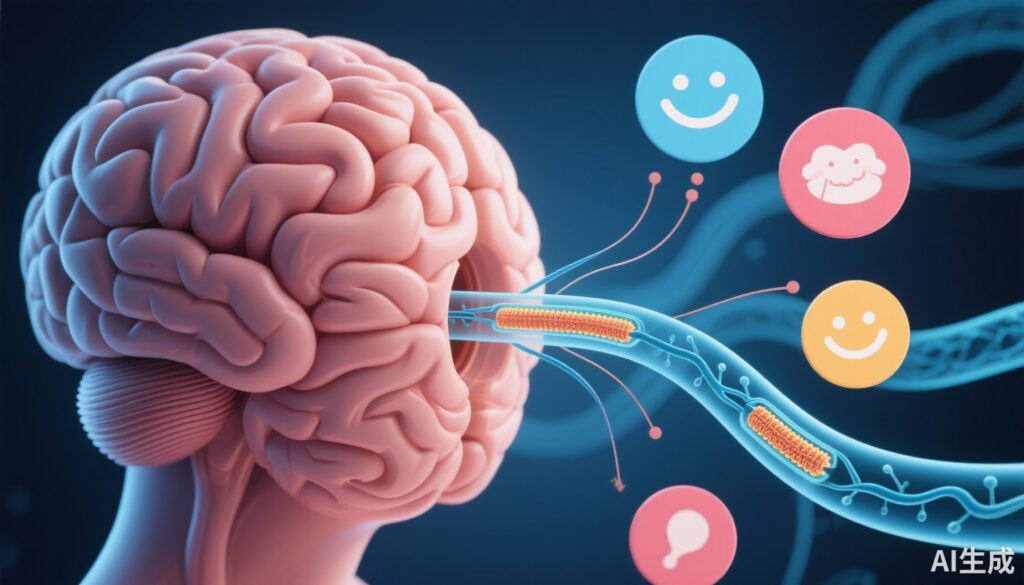Highlight
- Azetukalner, a novel KV7 potassium channel opener, was evaluated in a phase 2 randomized clinical trial for adults with moderate to severe major depressive disorder (MDD).
- The 20 mg dose showed clinically meaningful reduction in depressive symptoms by 6 weeks and significant improvement as early as 1 week on the MADRS scale.
- Significant improvements were seen in secondary outcomes, including anhedonia measured by the Snaith-Hamilton Pleasure Scale (SHAPS), and in the Hamilton Depression Rating Scale (HAM-D17).
- The safety profile was comparable to placebo, suggesting azetukalner is well tolerated.
Study Background
Major depressive disorder (MDD) is a highly prevalent psychiatric condition characterized by persistent low mood, anhedonia, and functional impairment. Despite numerous available antidepressant therapies, a substantial proportion of patients experience inadequate therapeutic responses, delayed onset of efficacy, or intolerable side effects. This underscores the urgent need for novel treatment approaches that modulate distinct neurobiological mechanisms.
KV7 potassium channels play a role in regulating neuronal excitability and neurotransmitter release. Preclinical data suggest that modulation of these channels may influence mood-regulating circuits and have antidepressant potential. Azetukalner is a first-in-class, potent KV7 potassium channel opener, hypothesized to restore neuronal homeostasis and ameliorate depressive symptoms.
Study Design
The X-NOVA trial was a multicenter, randomized, double-blind, parallel-group, placebo-controlled phase 2 study designed to evaluate the efficacy and safety of azetukalner in adults aged 18–65 years with moderate to severe MDD currently experiencing a depressive episode. Enrollment occurred from April 2022 to October 2023.
Eligible participants were randomized in a 1:1:1 ratio to receive oral azetukalner at 10 mg or 20 mg once daily with food, or placebo, for 6 weeks, followed by a 4-week follow-up period. Concomitant antidepressants were prohibited to isolate azetukalner’s effect.
The primary efficacy endpoint was change in Montgomery-Åsberg Depression Rating Scale (MADRS) score at 6 weeks. Secondary endpoints included changes in the Snaith-Hamilton Pleasure Scale (SHAPS) assessing anhedonia and the Beck Anxiety Inventory. Exploratory endpoints included the Hamilton Depression Rating Scale, 17-Item (HAM-D17), and MADRS changes at week 1. Safety assessments included monitoring treatment-emergent adverse events (TEAEs).
Key Findings
A total of 168 participants were randomized (56 per group), with a mean age of 47.2 years; 66.5% were female. The modified intent-to-treat population included 164 participants.
By week 6, the mean reduction in MADRS scores was -13.90 points with placebo, -15.61 points with 10 mg azetukalner, and -16.94 points with 20 mg azetukalner. The 20 mg dose achieved a clinically meaningful but statistically nonsignificant additional reduction compared to placebo (-3.04 points; 95% CI, -7.04 to 0.96; P = .14). Notably, at week 1, the 20 mg dose showed a significant improvement versus placebo (-2.66 points; 95% CI, -5.30 to -0.03; P = .047), indicating an earlier onset of action.
For the exploratory HAM-D17 scale, the 20 mg dose demonstrated a significant reduction at week 6 compared to placebo (-13.3 vs. -10.2 points; P = .04), supporting robust antidepressant activity.
Regarding anhedonia, the SHAPS scores decreased significantly more with 20 mg azetukalner (-7.77 points) than placebo (-5.30 points; P = .046), highlighting potential benefits on reward processing, a domain often resistant to conventional therapies.
Anxiety symptoms measured by the Beck Anxiety Inventory improved across all groups; however, no data indicated significant differences between azetukalner and placebo.
Safety and tolerability profiles were similar across treatment arms, with comparable rates of discontinuation due to TEAEs, suggesting azetukalner’s favorable safety.
Expert Commentary
This proof-of-concept trial introduces azetukalner as a promising agent operating via KV7 potassium channel opening — a novel neuropharmacological target in depression. The early separation from placebo on MADRS at week 1 is particularly encouraging since rapid onset remains a key unmet need in antidepressant therapy. The improvement in anhedonia points towards an effect on reward circuitry, which may confer advantages over traditional monoaminergic antidepressants.
Limitations include the modest sample size and lack of statistical significance in the primary endpoint, which could be due to sample variability or insufficient power. The short 6-week duration restricts conclusions regarding long-term efficacy and tolerability. Additionally, exclusion of concomitant antidepressants limits direct comparisons to standard care but strengthens mechanistic attribution.
Future studies should replicate these findings in larger populations, explore effects on other symptom domains and functional outcomes, and evaluate maintenance therapy. Biomarker studies may elucidate underlying pathways and identify responders.
Conclusion
In adults with moderate to severe MDD, azetukalner demonstrated preliminary antidepressant efficacy, with a rapid onset and notable improvement in anhedonia, alongside a favorable safety profile. These findings support further clinical development of azetukalner and highlight KV7 potassium channel modulation as a novel therapeutic strategy in depression.
Funding and Trial Registration
The X-NOVA trial was funded by the developing pharmaceutical company and related stakeholders. Clinical trial registration: ClinicalTrials.gov Identifier: NCT05376150.
References
1. Butterfield NN, Luzon Rosenblut C, Fava M, Correll CU, Rothschild AJ, Murrough JW, et al. Azetukalner, a Novel KV7 Potassium Channel Opener, in Adults With Major Depressive Disorder: A Randomized Clinical Trial. JAMA Netw Open. 2025 May 1;8(5):e2514278. doi: 10.1001/jamanetworkopen.2025.14278.
2. Fava M. Diagnosis and definition of treatment-resistant depression. Biol Psychiatry. 2003 Nov 1;53(8):649-59.
3. Millan MJ, Agid Y, Brüne M, et al. Cognitive dysfunction in psychiatric disorders: characteristics, causes and the quest for improved therapy. Nat Rev Drug Discov. 2012 Feb 1;11(2):141-68.
4. Peters AA, Huettl P, Mildenberger W, et al. KV7 channel openers: promising novel antidepressants? Arch Pharm (Weinheim). 2023;356(1):e2200247.



